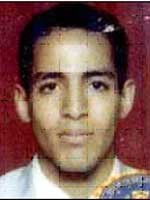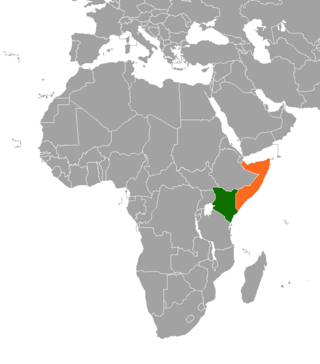| |||||
| Decades: | |||||
|---|---|---|---|---|---|
| See also: | |||||
The following lists events that happened during 2014 in Kenya .
| |||||
| Decades: | |||||
|---|---|---|---|---|---|
| See also: | |||||
The following lists events that happened during 2014 in Kenya .
| | This section needs expansion. You can help by adding to it. (May 2020) |

The 2002 Mombasa attacks were a two-pronged terrorist attack on 28 November 2002 in Mombasa, Kenya against an Israeli-owned hotel and a plane belonging to Arkia Airlines. An all-terrain vehicle crashed through a barrier outside the Paradise Hotel and blew up, killing 13 and injuring 80. At the same time, attackers fired two surface-to-air missiles at an Israeli charter plane. The Paradise Hotel was the only Israeli-owned hotel in the Mombasa area. The attacks were believed to be orchestrated by al-Qaeda operatives in Somalia in an attempt to disrupt the Israeli tourist industry on the African continent. Much speculation has occurred as to who the perpetrators are, but no complete list of suspects has been defined. The attack was the second al-Qaeda terrorist operation in Kenya, following the bombing of the U.S. embassy in Nairobi in 1998. Following the attack, the UN Security Council and other nations condemned the bombing.

Samantha Louise Lewthwaite, also known as Sherafiyah Lewthwaite or the White Widow, is a British terrorist who is one of the Western world's most wanted terrorism suspects. Lewthwaite, the widow of 7/7 London terrorist bomber Germaine Lindsay, is accused of causing the deaths of more than 400 people. She is a fugitive from justice in Kenya, where she is wanted on charges of possession of explosives and conspiracy to commit a felony and is the subject of an Interpol Red Notice requesting her arrest with a view to extradition.

Saleh Ali Saleh Nabhan also known as Abu Yusuf, was an operative of al-Qaeda in Somalia. He was listed on the FBI's third major "wanted" list, the FBI Seeking Information – War on Terrorism list, for his association with multiple attacks in Kenya in 2002, as well as his possible involvement in the 1998 United States embassy bombings, in which over 250 people lost their lives.
There is a significant crime rate in all regions of Kenya. Petty offences are the most common crime with stealing being the most reported crime. Robbery and theft are among the least cited criminal offences. Crime in Kenya is comparable to Tunisia, with a rate of 3.46 crimes per 100,000 people. However, crime in Kenya often goes unreported and police may lack the training or experience to effectively respond to crimes. Despite the reported low crime rate, Kenya faces significant challenges with organised crime, with many gangs working with corrupt police officers and sometimes even the government. Kenya has a criminality score of 7.02 on the Organised Crime Index, the 16th-most in the world, an improvement from 11th in 2021.
From late 2011 to 2014, Kenya experienced an upsurge in violent terrorist attacks. Kenyan government officials asserted that many of the murders and blasts were carried out by al-Shabaab in retaliation for Operation Linda Nchi, a coordinated military mission between the Somalian military and Kenyan military that began in October 2011, when troops from Kenya crossed the border into the conflict zones of southern Somalia. According to Kenyan security experts, the bulk of the attacks were increasingly carried out by radicalized Kenyan youth who were hired for the purpose. Kenya security officials also indicated that they were part of death squads, which carried out many of the killings under the orders of a government security council. By mid-2014, the cumulative attacks began affecting Kenya's tourism industry, as Western nations issued travel warnings to their citizens.
Aboud Rogo Mohammed was a Kenyan Muslim cleric. He was alleged to have been an Islamist extremist and was accused of arranging funding for the al-Shabaab militia in Somalia. He was shot dead in Kenya, and his death triggered protests and violence by hundreds of protestors. Rogo is the fifth alleged Islamic radical killed in Kenya in 2012. David Ochami, a Kenyan journalist, stated that Rogo had the oratory prowess of Hezbollah leader Hassan Nasrallah and the logic of Egyptian ideologue Yusuf al Qaradawi.

Many terrorist attacks have occurred in Kenya during the 20th and 21st centuries. In 1980, the Jewish-owned Norfolk hotel was attacked by the Palestine Liberation Organization (PLO). In 1998, the US embassy was bombed in Nairobi, as was the Israeli-owned Paradise hotel in 2002 in Mombasa. In 2013, the Somali jihadist group al-Shabaab killed 67 people at Nairobi's Westgate Shopping Mall. There have also been many other attacks.

The Somali–Kenyan conflict has been an issue within Kenya since the colonial period. Problems have ranged from skirmishes between the two communities and have led to terrorist attacks, police harassment, extortion, home invasions, physical violence, and massacres perpetrated against Somalis and Kenyans.

On 21 September 2013, four masked gunmen attacked the Westgate shopping mall, an upmarket mall in Nairobi, Kenya. There are conflicting reports about the number killed in the attack, since part of the mall collapsed due to a fire that started during the siege. The attack resulted in 71 total deaths, including 62 civilians, five Kenyan soldiers, and all four gunmen. Approximately 200 people were wounded in the massacre.
On 4 May 2014, two improvised explosive devices exploded on buses in Nairobi, Kenya, killing three people and injuring sixty-two. Both of the bombs exploded northeast of Nairobi on the Thika Road, an eight-lane controlled-access highway, and detonated 1 kilometre (0.62 mi) apart. Twenty of the wounded were in critical condition after the blast.
On 16 May 2014, two improvised explosive devices were detonated simultaneously in the Gikomba market in Nairobi, Kenya, killing at least 12 people and injuring 70. The first blast came from a minibus and the second from within the market. Two people were reportedly arrested at the site of the explosions. Shortly after the attacks, hundreds of people swarmed onto the crime scene despite police efforts to stop them.
Between 15 June and 17 June 2014, more than 60 people were killed in attacks in and near Mpeketoni, Kenya. The Somalia-based Al-Shabaab militant group claimed responsibility, but the Kenyan President Uhuru Kenyatta asserted that the attacks were organized by local politicians with ties to a network of gangs. Correspondents from the area suggested that the attacks may have been motivated by ethnic or religious hatred, or revenge for land grabbing.
On 2 April 2015, gunmen stormed the Garissa University College in Garissa, Kenya, killing 148 people, and injuring at least 79. The militant groups Al-Qaeda and Al-Shabaab, which the gunmen claimed to belong to, took responsibility for the attack. The gunmen took over 700 students hostage, freeing Muslims and killing those who identified as Christians. The siege ended the same day, when all four of the attackers were killed. Five men were later arrested in connection with the attack, and a bounty was placed for the arrest of a suspected organizer.

The Garowe attack was a bombing of a UN van in Garowe, Puntland, Somalia. Between 7 and 10 people were killed, including the attacker and four UNICEF workers. The Al-Shabaab militant group claimed responsibility for the blast. The Puntland administration subsequently appointed a governmental committee to probe the circumstances surrounding the attack, and apprehended over a dozen suspects.

This is a 2016 timeline of events in the Somali Civil War (2009–present).

From the 15 to 16 January 2019, a coordinated attack against civilians occurred at the DusitD2 complex in Westlands District, Nairobi, Kenya. The attack began at around 14:30 EAT (UTC+3), shortly after a suicide bomber blew himself up near the center of the complex at a restaurant. Four attackers associated with Harakat Al-Shabaab al-Mujahideen carried out a mass shooting for over 22 hours which left 21 civilians, one Kenyan soldier and all five militants dead.

On 6 December 2019, at least 11 people, including seven police officers, were shot dead on or outside a bus in Kenya. The Medina Bus Company vehicle and its passengers were attacked on a road in a rural area between Wajir and Mandera in northeastern Kenya. Al-Shabaab claimed responsibility for the attack.
This is a 2019 timeline of events in the Somali Civil War (2009–present).
On January 31, 2022, al-Shabaab attacked a bus carrying civilians in Mandera County, Kenya, near the border with Somalia. Ten people were killed, and thirteen injured, in the attack.